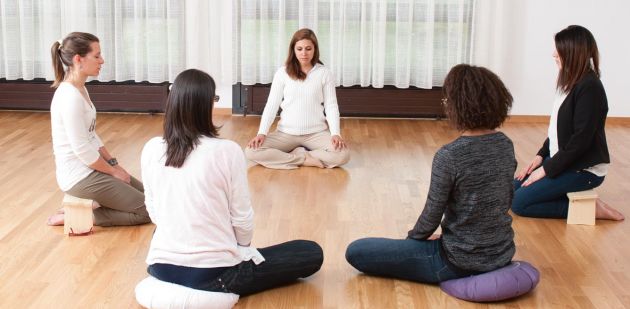Daniela Dunker Scheuner teaches former alcoholics how to stay dry through meditation.

With floor mats, blankets, benches and round cushions, the plain room in one of the pavilions at Cery, the headquarters of the psychiatry department of CHUV, takes on a peaceful ambiance a few hours each week. Seated in the lotus position, about ten patients are meditating, eyes closed, guided by the soothing, southernaccented voice of Daniela Dunker Scheuner.
Psychologist and head of the Cognitive and Behavioural Therapy Teaching Unit of the Department of Psychiatry and associate psychologist with the Alcohol Treatment Centre at the Lausanne University Hospital (CHUV), she asks them to focus on the sounds around them, their breathing, sensations in their body, emotions, desires and the thoughts that pass through their minds like clouds, without judging them.
“Being fully aware of what’s happening within you helps identify and bring out automatic reactions that control our actions, thoughts and emotions,” says Daniela Dunker Scheuner. “This increases our ability to tolerate our emotional states and desires and to deal with them.” Offered to patients working to overcome alcohol dependency through abstinence, these weekly sessions are based on a new approach that is growing fast in Switzerland.
Inspired by two areas that at first seem diametrically opposed – eastern meditation and western science – Mindfulness-Based Relapse Prevention (MBRP) aims to teach people with addictive behaviours to accept their temptations with compassion, rather than fighting them, because they will eventually diminish and disappear. “There’s nothing esoteric about it,” says the thirty-something Brazil native. “Actually, focusing your attention on physical sensations that are already there is very concrete.” She studied psychology in Sao Paulo, at the University of Geneva and at Claude Bernard University in Lyon, where she specialised in cognitive and behavioural therapy.
In 2004, as part of her new position at the Alcohol Treatment Centre at the CHUV, she contacted Alan Marlatt, professor of psychology and director of the Addictive Behaviours Research Centre at the University of Washington, who developed the MBRP programme. Daniela Dunker Scheuner became increasingly involved in the two approaches, to the point of participating in the translation of the founder’s book, “Relapse Prevention: Maintenance Strategies in the Treatment of Addictive Behaviours”, into French, which was published in 2008. She was then trained as an official MBRP instructor and trainer by Alan Marlatt’s team. She now divides her time between her groups of patients, individual consultations and training other professionals to develop this method in Switzerland and France. She also practises mindfulness meditation herself every day.
Inspired by both eastern meditation techniques
and western science, “Mindfulness-Based Relapse
Prevention” (MBRP) is offered as a therapy to help
treat alcohol addiction or as an approach to abstinence.
This method was developed in the United States and teaches patients to accept their temptations as a means of better preventing relapse.